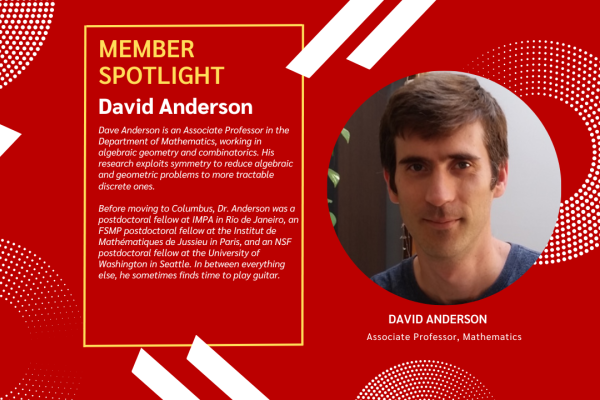Member Spotlight - David Anderson

With this week's STEAM member spotlight, we want to highlight David Anderson!
Dave Anderson is an Associate Professor in the Department of Mathematics, working in algebraic geometry and combinatorics. His research exploits symmetry to reduce algebraic and geometric problems to more tractable discrete ones.
Before moving to Columbus, Dr. Anderson was a postdoctoral fellow at IMPA in Rio de Janeiro, an FSMP postdoctoral fellow at the Institut de Mathématiques de Jussieu in Paris, and an NSF postdoctoral fellow at the University of Washington in Seattle. In between everything else, he sometimes finds time to play guitar.
We asked David a few questions about his role at Ohio State, as well as his thoughts on the STEAM Factory!
1. Tell me about yourself and your role at Ohio State University.
I’m an associate professor in the Mathematics Department. I arrived as a tenure-track assistant professor in 2014.
2. Tell me about your research in laymen’s terms (if possible!). What do you find interesting about this subject matter?
I work in combinatorial algebraic geometry, which covers a fairly broad swath of mathematics but isn’t necessarily something most people would have heard of. In the specific field I’m in, a kind of prototypical problem is this: in usual 3-dimensional space, draw four lines at random. How many lines meet all four of the lines you drew? (The answer to that particular problem has been known for a very long time, but things quickly get more complicated when you vary the parameters!)
What drew me to the subject is something that I think attracts a lot of mathematically-minded people: you set out to solve a problem, and find that it’s connected to all kinds of other problems in totally unexpected ways. And in this particular area, we tend to boil calculations down to pictures or games, which makes it fun.
3. What are your interests/hobbies in your free time?
With two small kids, I don’t have a ton of free time these days, but I enjoy playing music and hiking when I can.
4. What is your favorite STEAM event/program?
It’s been a while since I’ve been to one, but I always enjoyed the Franklinton Fridays open houses. It’s neat to see people wander in from touring the art studios to check out quick public lectures.
5. You will be moderating our upcoming STEAM Exchange on AI. What draws you to this topic? Why do you think it’s an important topic to discuss right now?
I know some of our colleagues on the CS side have been working in machine learning for decades, but I first started paying more attention when GPT-3 came out in 2020, since it was available in a more consumer-oriented format. Playing around with that was a bit of a pandemic hobby. And since a part of what’s going on under the hood – multiplying very large matrices – is adjacent to things related to my research, I figured I had a chance of understanding the engineering at some point.
But just in the last couple months, it seems like we’re seeing a Cambrian explosion of new developments and applications. With ChatGPT and its cousins making headlines every other day, it seems like a safe bet that these language models and their descendants are soon going to be touching all our lives in a more visible way than previous generations of AI have done so far. So it certainly seems timely to talk about it now! I’m looking forward to seeing what our presenters have to say.
6. You've been a STEAM member for a long time now. Has STEAM has evolved over time and what has encouraged you to remain an active STEAM member?
I guess I’m more of an on-again/off-again participant in STEAM, but it has indeed been a long time. When I interviewed at OSU in 2012, my hosts took me over to a Christmas market at 400 W. Rich, which at the time was a mostly vacant warehouse, maybe 1/3 occupied by artist studios. Roman was with the group, taking notes on square-footage and rental rates for what was to become the STEAM Factory event space. That kind of energy was part of what got me excited about joining OSU in the beginning, and it’s been very cool to see the development from idea to reality, and also to see the membership grow with new faculty over the years. To echo something I heard from another long-time member, one of the great things about STEAM is how it keeps us plugged in to that broad intellectual curiosity which we sometimes lose sight of while digging into our niche areas of research, but was what led many of us to academia in the first place.
